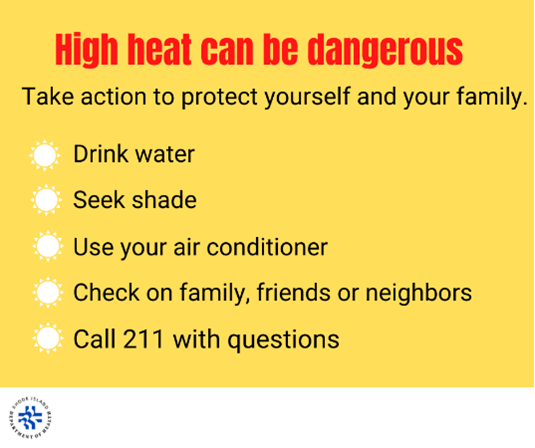Heat wave can threaten your health
By Will Collette
Charlestown and the rest of South County is under a high heat advisory from the National Weather Service that will continue through tomorrow when thunderstorms are expected to roll through the area.
The RI Health Department suggests you do the following:
The Rhode Island Department of Environmental Management is predicting that air quality will reach UNHEALTHY levels during the late afternoon and into the evening on Tuesday June 29th. The alert is being issued statewide. The poor air quality will be due to elevated ground level ozone concentrations. Fine particles are also expected to reach moderate, especially around Providence. Ozone is a major component of smog and is formed by the photochemical reaction of pollutants emitted by motor vehicles, industry and other sources in the presence of elevated temperatures and sunlight.
Rhode Island residents can help reduce air pollutant emissions. Limit car travel and the use of small engines, lawn motors and charcoal lighter fuels. Travel by bus or carpool whenever possible, particularly during high ozone periods.
The Rhode Island Department of Health warns that unhealthy levels of ozone can cause throat irritation, coughing, chest pain, shortness of breath, increased susceptibility to respiratory infection and aggravation of asthma and other respiratory ailments. These symptoms are worsened by exercise and heavy activity. The children, elderly and people who have underlying lung diseases, such as asthma, are at particular risk of suffering from these effects. As ozone levels increase, the number of people affected, and the severity of the health effects also increase.
To avoid experiencing these effects, limit outdoor exercise and strenuous activity and stay in an air-conditioned environment if possible, during the afternoon through late into the evening hours, when ozone levels are highest. Schedule outdoor exercise and children's outdoor activities in the morning hours. Individuals who experience respiratory symptoms may wish to consult their doctors.
The unhealthy levels of ozone are expected to last if the hot sunny weather is present. The Rhode Island Chapter of the American Lung Association reminds people that "when you can't breathe nothing else matters."
Below are some ways that you can help contribute to lower ground level ozone levels and cleaner air:
1. Limit driving. Avoid unnecessary car trips. Carpool, walk or ride the bus or a bicycle whenever possible.
2. Minimize starts and avoid unnecessary acceleration. Vehicle emissions are highest during starting and acceleration.
3. Reduce idling. Avoid congested traffic and lines at drive-through windows.
4. Drive your lowest emission vehicle. Use the most fuel-efficient, usually the newest, car you have whenever possible.
5. Maintain your vehicle. Get a tune-up at the beginning of each summer.
6. Minimize lawn mower emissions. Tune-up your lawn mower and use electric or handpowered equipment if possible.
7. Limit use of solvent-based household products. Use water-based or low solvent paints, varnishes, cleaners, and personal care products.
8. Limit barbecue emissions. Use an electric starter instead of lighter fluid to start charcoal fires, or use an electric, natural gas, or propane grill.
For more information about DEM divisions and programs, visit www.dem.ri.gov. Follow us on Facebook at www.facebook.com/RhodeIslandDEM or on Twitter (@RhodeIslandDEM) for timely updates.


